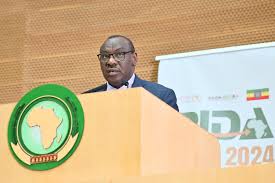The Executive Secretary of the United Nations Economic Commission for Africa (ECA), Claver Gatete has called for fair access to global finance and investment to effectively tackle the climate crisis and accelerate energy transition across Africa.
Speaking at the 13th International Forum on Energy for Sustainable Development which is taking place in Bangkok, Thailand under the theme “Taking Action for Just Energy Transition”, Gatete said Africa has received 2.8 percent of global renewable energy investments in 2024.
“Africa, which is endowed with vast clean energy resources of global scale, has received 2 percent of global renewable energy investments in 2019, and 2.8 percent by 2024,” said Gatate according to a speech released on Tuesday by UNECA.
He said Africa sustains global critical minerals and batteries value chains with the supply of critical minerals (e.g. 70% of global cobalt, 60% of platinum group metals and manganese, 25 percent of bauxite and 20 percent of phosphate production) while accruing minimal value addition.
Gatete said globally, the world faces multiple challenges; most urgent of which include the climate crisis and adequate finance particularly to developing and emerging economies to invest in sustainable transitions.
“The energy sector, contributing 73 percent of global emissions, is at the heart of required global transitions. Even though Africa’s carbon footprint is negligible, the continent is committed to sustainable transitions,” he said.
“We assess that a 1.8°C temperature rise will erode Africa’s real GDP by 2 percent, with it the hard-won gains of sustainable development. We must, therefore, sustain climate action and facilitate sustainable transitions,” he said.
He said Africa is encouraged by the latest assessment of global energy investments which is expected to surpass $3 trillion in 2024, of which $2 trillion are expected to be committed to clean energy investments.
According to the executive secretary, the global demand for critical minerals, especially under a net-zero policy scenario, is expected to triple.
“Imbalances resulting in Africa’s minimal value capture in the critical mineral value chains indeed call for a balanced and inclusive approach to ensure transitions also deliver sustainable development,” he continued.
A just and inclusive energy transition requires concrete actions, he said, calling for integrating inclusiveness and social justice principles in energy strategies; establishing sound governance and capacitising institutions to deliver on transitions; and reinforcing investments in social infrastructure.
MG/as/APA


